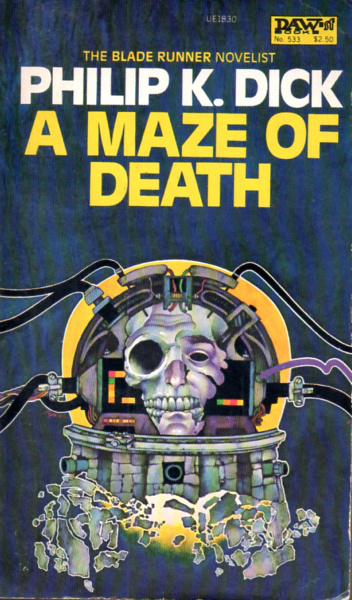And the Philip K. Dick series continues while I work on some postings on new material.
Raw Feed (1990): A Maze of Death, Philip K. Dick, 1970.
I wasn’t particularly looking forward to reading this Dick novel since I’ve never heard it referred to as one of his major works and even Dick himself somewhat disparaged it.
Nevertheless, Dick seldom disappoints and I consider this one of his better novels.
The tale of typically Dickian messed up protagonists — obsessed, self-absorbed, basically failures — banded together and being killed one by one was compelling.
As usual, Dick introduced the usual plot twists. First the characters believe they’re subjects of a military experiment, then releasees of a mental asylum who have been murdering each other (only proving they are unfit for life outside the asylum), and then the awful, depressing (and this is the most depressing Dick novel I’ve ever read) truth is revealed.
The characters have been existing in a fantasy world created by the consensual projection — via computer (one of the first sf uses of the virtual universe run by computer?) — of their minds. They are trapped aboard a spaceship — and have been for 15 years — and the world of Delmak One is only one of many they have created to escape boredom and vent interpersonal hostilities.
There is no escape.
And, though they decry the new violence that has crept into their simulations with Delmak One — they ultimately return to the world that is a physical manifestation of their sickness as individuals and a group.
Only Seth Morley, the novel’s damaged and weary protagonist, is spared when the simulated religion, which Morley desperately longs to be true and is an obvious synthesis of world religions with a heavy dose of Gnosticism, of Delmak One is validated, and the Intercessor saves him.
Even then, however, his only wish is to be an unthinking desert plant.
When Dick introduced, in the novel’s second to last chapter, the reality of Delmak One being a computer directed simulation I thought he had undercut the emotional tone of the novel, especially the final, apocalyptic scenes on Delmak One. But when he reintroduced that tone with revelations as to the characters’ true situation, that tone was reestablished with an even blacker gloss.
More reviews of fantastic fiction are indexed by title and author/editor.
Advertisements Share this:




